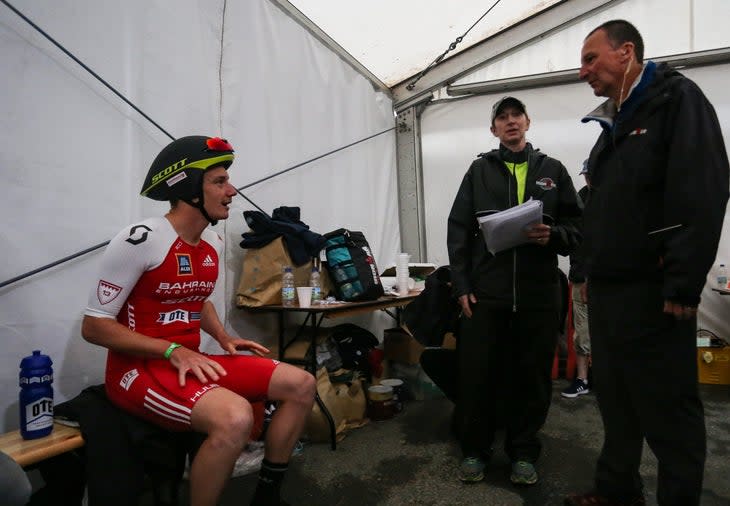Inside the Secret World of Triathlon Referees
This article originally appeared on Triathlete
When you think of a referee, you probably think of someone decked out in white and black stripes with an all-powerful whistle around their neck. They're likely sprinting back and forth on a court or a field, ready to call out a foul at any moment.
Triathlon has referees, too, although they couldn't be further from the stereotypical "referee" archetype most think of.
Triathlon referees, or "course marshals" as they're formally titled, are present during every leg of the race for high-profile races (think: races with pros or world championship-level races), but most age-groupers are only aware of them during the bike portion.
Course marshals are most noticeable during the bike leg as they cruise around on the back of a motorcycle with a small notebook, looking for anyone who is seeking to gain an advantage illegally--or who isn’t paying attention to the rules.
While many athletes feather their brakes as the sound of the moto rumbles behind them, seeking to make it extra-clear to the referee they aren't drafting, you may be surprised to find out that for age groupers at least, triathlon referees aren't hungry to give out penalties. In fact, they'd rather not.
The methodology behind when and why a course marshal deals out a penalty is a story for another day. The real question is: Who are the people behind the mask (er... helmet) on the motorcycle? How did they get here? Are they triathletes themselves?
Tri refs don't appear out of nowhere. There are courses, certifications, and more that each must complete before officiating a race.

How to become a triathlon referee
Triathlon can be separated into two types of races: draft-legal and non-drafting. Age groupers generally participate in non-drafting races as they are safer for athletes and easier for local race directors to orchestrate.
In the course marshal world, the same separation exists. Referees can be a Competitive Rules Official (CRO) if they wish to officiate non-drafting events and/or they can be a World Triathlon Technical Official if they wish to officiate ITU and draft-legal events.
Within the CRO world, there are categories ranging from Category 5 as a trainee all the way to Category 1, who are the "big bosses" that have been refs for at least three years and receive near-perfect scores on their rules exams.
You might find a Category 3 or 4 referee at a local race. These folks have completed their introductory clinic with USA Triathlon and received marks of at least 85% on their rules education exam. Category 3 refs must officiate at least two races a year and remain in good standing with USA Triathlon. Category 3 refs must also remain a "Cat 3" for at least one year before moving up to being a "Cat 2" official.
At non-drafting races where there are professionals racing, such as the Ironman World Championship, you'll likely only find Category 1 referees. These are the officials who have called dozens of races over multiple years and are calm, cool, and collected on the big stage.
For those who are more interested in draft-legal officiating via the World Triathlon Organization, there is a similar tiered system to follow.
Unlike the CRO system, the World Triathlon Organization ranks its Level 1 referees as the lowest level and its Level 3 referees as those who may officiate major international events such as the Olympics.
To become a Level 1 draft-legal official, folks must complete a half-day course that involves both hands-on practical training and more theoretical (i.e., "How would you approach this situation?") discussion. The intensity of the certifications increases from there, all the way to a three-day course and studying Olympic and Paralympic standards in order to achieve a Level 3 designation.
Similar to the CRO program, a World Triathlon referee cannot move up the ranks until they've been at their current designation for at least a year, if not more.
Jay Jackson got into triathlon after college as a way to stay fit. Soon, watching live footage on the World Triathlon website became a favorite pastime – and a then-unknown gateway to becoming a technical official.
"I was watching a draft-legal professional race and kept seeing these folks throughout the course labeled 'Technical Official,'" Jackson says. "I did some research to learn more and knew I wanted to become one – it's not like I was going to race every triathlon, so I figured becoming an official would be a unique way to expand my involvement in the sport."
Jackson completed his Level 1 World Triathlon referee certification about five years ago and renews it every couple years, per the World Triathlon stipulations. He has officiated races such as the famous Clermont Draft-Legal Challenge and Sarasota World Cup and plans on continuing to do so for the foreseeable future.
It's important to note, too, that all referees complete some sort of "safe sport" training, which involves training around doping, assault, and an athlete's wellbeing. Being a referee is more than just being present on the course; they're expected to be active participants in the sport in and out of races.
When it comes to officiating 70.3 and Iron-distance events, which are all non-drafting, the road is long and competitive – just like for athletes.
"Ironman referees are USA Triathlon-certified officials," says Ron Kowalcyzk, head referee at Ironman. "To even work an Ironman event, a referee has to have obtained a significant amount of experience at shorter events – and even then, an referee will need to have worked multiple full-distance Ironman events for up to five years before they're asked to work an event with a pro field."
RELATED: Inside the Mind of a Triathlon Race Marshal

Running the numbers
How many course marshals does it take to supervise a race? It varies. As you can imagine, a local sprint triathlon requires far fewer referees than a long-course tri.
"Determining the number of referees for a race is both an art and a science," says Mark Turner, commissioner of officials for USA Triathlon. "Generally, we say that the ideal ratio is one referee for every 200 athletes."
And, in most cases, local races are focused on placing their one or two referees on motos on the bike course. It's unlikely to have roving swim or run referees at smaller races due to the cost.
Turner noted that currently, for a USA Triathlon-sanctioned sprint- or Olympic-distance race, it would be a total of $165 for a single referee, who would thereby also serve as the head referee for that day. Each additional referee would be $90.
For races longer than an Olympic-distance event, the head referee would be $225 and each additional referee would be $150.
It's not unlikely that you've raced a local tri that didn't have any referees, yet was sanctioned by USA Triathlon. To some degree, small races operate on the honor system of sanctioning with USAT and then working with their regional officials coordinator to secure referees. But not all do.
Major events such as 70.3 and Iron-distance races aim to ascribe to the 200-athlete ratio – there can be upwards of eight or 10 referees across the swim, bike, and run portions at larger events.
For ITU and professional draft-legal racing, the crews of race officials look like their own tri team – there are sometimes upwards of two dozen race officials.
In the photo far above that Jackson provided from his time officiating at the Sarasota World Cup there are 31 people and all had "some function of officiating," according to Jackson.
Draft-legal rules abound far more than non-drafting races and therefore require more referees and technical officials.
For example, draft-legal races require athletes to put all their used swim equipment and bike equipment into a designated bin in their transition area when the respective legs are completed. Failure to do so can result in a penalty. There are often multiple technical officials stationed in the draft-legal transition zone to keep an eye out for any equipment that misses a bin.
This is definitely not the case in non-drafting races where the transition zone can often feel like a free-for-all mosh pit of strewn-about wetsuits, helmets, and nutrition packets. No referees there, folks.
RELATED: 9 Race Rules You Didn't Know You Were Breaking

"We aren't out to get you"
All three officials in this article unanimously agreed: Triathlon referees prefer not to give out any penalties. They are not out to ruin your race.
"We are shifting the culture with USAT referees from them viewing their role as 'policing' to more so 'investigating,'" Turner says. "We want our referees to take a second and really scope out the situation and understand the full context of what's going on before making a call."
Kowalcyzk agreed. He noted that the goal of Ironman referees is to make sure the race remains fair with "an eye toward ensuring an athlete isn't obtaining an unfair competitive advantage."
That seemed to be the theme among all three referees; they aren't eagle-eyed on any one infraction, hungrily waiting to penalize an athlete. Instead, they're more interested in keeping the race fair and safe.
Turner noted that USAT referees are now trained to ride alongside potential draft packs in non-drafting races for a minute or so to better understand who is actually drafting, who is potentially stuck in the group with no way to exit, and who should be penalized. Even then, if the group breaks up and does not reform, the referee may not award a penalty – their presence was enough of a warning.
Both Turner and Kowalcyzk would really like non-draft triathletes to know one thing: If you ride into the draft zone of 12 meters with the intent to pass within the allotted 25 seconds, the only way to legally exit that draft zone is to pass the rider. Slowing down to fall out of the draft zone and not complete the pass can result in a penalty. This is something all refs do keep close eyes on.
Pro-level ITU races are a bit more intense as the stakes are higher; usually, there is significant money on the line for the participating professionals.
Jackson explained that bike mount and dismount lines are filmed from multiple angles during the race to ensure that all athletes mount and dismount before the line. Although ITU officials don't want to give out penalties either, they need to hold all pro athletes to the highest standards of the sport to protect the integrity of professional racing.
Three times penalties changed the outcome of a race
During the 2022 Commonwealth Games, Kiwi athlete Hayden Wilde was handed an infraction for unfastening his helmet prior to racking his bike – an illegal move in ITU racing. Wilde was served a 10-second penalty, which in draft-legal racing can be the difference between gold and silver, and indeed it was. Wilde came away with silver, just 13 seconds behind Brit Alex Yee, who took home gold.
Lucy Charles-Barclay received a two minute penalty during 2021 Challenge Miami for passing a fellow pro on the left – which is normally what you should do, but due to the race track format, athletes are supposed to pass others on the right. Charles-Barclay ended up coming in just 1:24 behind winner Jodie Stimpson. Who knows what might have been the case had Charles-Barlcay not stood in the penalty tent for two minutes?
Anne Haug also received a two minute penalty for incorrect passing at 2021 Challenge Daytona. She finished in second by 2:36 behind winner Paula Findlay. Haug used her incredible running prowess to move from 15th place post-penalty tent stint to second.
RELATED: Why Does A 10-Second Penalty Make So Much Of A Difference In World Triathlon Races?
For exclusive access to all of our fitness, gear, adventure, and travel stories, plus discounts on trips, events, and gear, sign up for Outside+ today.

